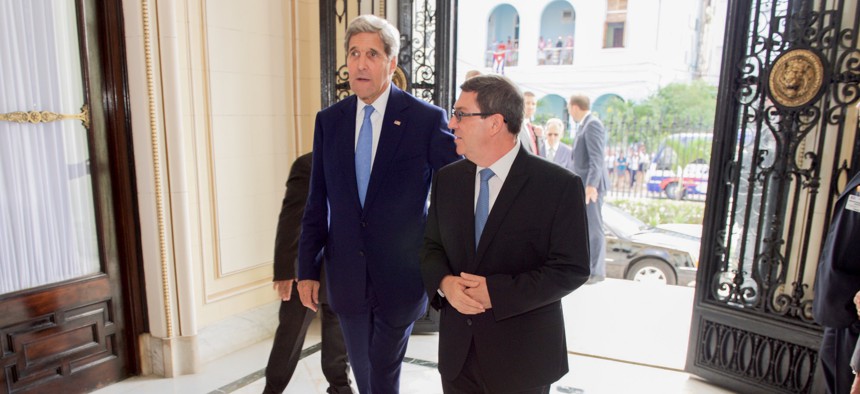
U.S. Secretary of State John Kerry and Cuban Foreign Minister Bruno Rodríguez enter the Cuban Ministry of Foreign Affairs in Havana Friday. State Department
Kerry Says U.S. and Cuba Will No Longer Be 'Prisoners of History'
The State Department chief welcomed the restoration of diplomatic ties Friday.
Secretary of State John Kerry appeared in Havana, Cuba, on Friday at the recently reopened U.S. Embassy, where he praised President Obama's decision to begin normalizing diplomatic ties with Cuba.
"Our leaders—President Obama and President Castro—made a courageous decision to stop being the prisoners of history and to focus on the opportunities of today and tomorrow," Kerry said, before quickly adding: "This doesn't mean that we should or will forget the past. How could we, after all?"
While signaling his hope that the United States and Cuba will work together in the future to the benefit of both countries, the Cabinet official also recalled a series of events that stretched and strained diplomatic relations between America and the island nation.
Kerry noted the fear and uncertainty felt in the United States at the time of the Cuban Missile Crisis.
"I was a student then, and I could still remember the taut faces of our leaders, the grim maps showing the movements of opposing ships, the approaching deadline, and that peculiar word: 'quarantine,'" Kerry said, describing his memories of the 1962 Cuban Missile Crisis.
"We were unsettled and uncertain about the future, because we didn't know when closing our eyes at night, what we would find when we woke up," Kerry recalled gravely.
Despite that grim acknowledgement of the past, the secretary of State was adamant in his support of President Obama's decision to start the process of normalizing diplomatic relations with the island nation, a decision announced by the administration last year.
Kerry's visit to the U.S. Embassy in Cuba marks the first time in 70 years that any U.S. secretary of State has set foot on the island since the two countries severed ties amid Cold War tensions in 1961.
President Obama and Democratic supporters, including Hillary Clinton, have said that the time has come to reopen ties with Cuba. The administration says that opening up diplomatic relations will ultimately benefit the United States by allowing the government to partner with Cuba on areas of mutual interest, such as health, migration, and drug-trafficking policy.
But critics say that that the United States has failed to extract important human-rights and other policy concessions from the Cuban regime in brokering the deal.
Marco Rubio, who has emerged as the most vocal Republican critic of the president's Cuba policy, slammed the ceremonial reopening of the U.S. Embassy in Havana in a speech delivered in New York early Friday morning, saying that if elected president, he would promptly take action to bolster the cause of Cuban dissidents in opposition to the regime.
"President Obama has rewarded the Castro regime for its repressive tactics and persistent, patient opposition to American interests," Rubio said. "He has ensured the regime will receive international legitimacy and a substantial economic boost to benefit its repression of the Cuban people."
A decision announced by the U.S. government not to allow Cuban dissidents to attend the ceremonial embassy reopening also sparked fierce pushback from critics.
"The opening ceremony, which is the flag-raising ceremony at the embassy, is principally a government-to-government event. It'll include officials from the Cuban government, a range of U.S. government agencies, as well as members of Congress," a senior State Department official told reporters on Wednesday.
Kerry plans to meet with Cuban dissidents at an event in Havana later in the day after the flag-raising ceremony.
In addition to the Secretary of State, a delegation of congressional lawmakers, including Democratic Sens. Barbara Boxer, Amy Klobuchar, Patrick Leahy and Republican Sen. Jeff Flake attended the embassy re-opening ceremony.
Political experts caution that it will be a long road to restoring full diplomatic relations between Cuba and the United States. Despite the steps taken so far to ease tensions, a trade embargo imposed by the United States on the island nation remains in place.
Most Americans support normalizing diplomatic relations with Cuba.
A Pew Research Center survey released in July found that 73 percent of Americans supported re-establishing diplomatic relations, while 72 percent said they would be in favor of ending the U.S.-Cuba trade embargo.
NEXT STORY: Will Making It Easier to Fire Feds Go Viral?







